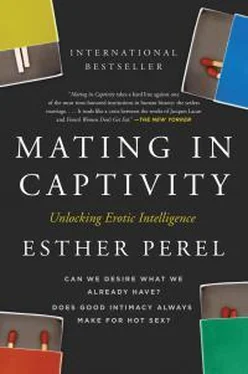When Work Doesn’t Work
We are indeed a nation that prides itself on efficiency. But here’s the catch: eroticism is inefficient. It loves to squander time and resources. As Adam Phillips wryly notes, “In our erotic life work does not work…trying is always trying too hard. Eroticism is an imaginative act, and you can’t measure it. We glorify efficiency and fail to recognize that the erotic space is a radiant interlude in which we luxuriate, indifferent to demands of productivity; pleasure is the only goal. Octavio Paz writes, “The moment of merging is a crack in time, a balm against the wounds inflicted by the minutes and hours of time. A moment totally eternal as it is ephemeral.” It is a leap into a world beyond.
This leap entails a loss of control that we’re taught from a very young age to guard against. We are socialized to tame our primal side: our unruly impulses, our sexual urges, and our rapacious appetites. Social order is built on this restraint, and lack thereof threatens to create chaos. Because loss of control is almost exclusively seen in a negative light, we don’t even entertain the idea that surrender can be emotionally or spiritually enlightening. But experiencing a temporary suspension of our discernible self is often liberating and expansive. I have seen many people stumble when they can’t simply take the problem of eros and fix it. They are left feeling bewildered and frightened by their slackened command. I help them learn how to relinquish control intentionally, as a means of personal growth and self-discovery.
Ryan and Christine have been in therapy for a year. I meet with them together and individually as they struggle through the transition from being a sexually entwined couple to being the parents of three small children. Following the birth of their twin daughters, the lovers’ erotic inspiration began gasping for air. While some couples accept fading intensity with gracious resignation, settling into affectionate companionship, Ryan and Christine don’t want to give up. The memory of what they once had is still dear to them. They make a clear distinction between having sex and making love, and they haven’t made love in a while. They’ve rented videos, they’ve taken baths together, and they are committed to their weekly date. They’ve tried a lot of things, some yielding satisfying results, others a total waste. Merely having sex is not really their issue. Of course they’d like to have it more often, but their concern is more about intensity than frequency. It’s not the diminishing amount of sex that bothers them, but its increasing dullness. They like to be proactive, and they’re shopping for new tools.
I can think of a number of things that I could suggest to this couple, joining them in their practical approach to the problem of diminishing desire. But I question the rationalist approach in matters of the heart. I think that the challenge of sustaining eros in a committed relationship over time is of a different nature. We don’t always know our aims in advance. Our desires are not exempt from conflict; nor are our passions free of contradictions. No amount of will or reason can dictate our love dreams. Reason doesn’t know the roots of our dreams; nor does it know the mysterious needs of the heart. We can’t always use the laws of profit and loss in our romantic and erotic lives. Applying the work ethos is tricky. Even the most logical approach cannot neutralize the ambivalence of love.
I tell Ryan and Christine, “I have nothing new to offer in the ‘how to’ department. You’ve had dates, you’ve been burning incense, you’ve cracked into the Astroglide. And it’s landed you a steady diet of sex that’s satisfactory without being really satisfying. Do I get it?”
“Yes, you get it, but what are you saying? That that’s it? Like the song, ‘Is That All There Is?’” Christine asks.
“There’s no logic to this. Passion is unpredictable; it doesn’t follow the dictates of cause and effect. What works on Monday might not work on Thursday. The solution is often a surprise, not the result of the kind of work you’ve been doing until now. So let’s not talk about work. Instead, let’s talk about freedom. Play.”
“Huh?”
“Try something with me,” I suggest to them. “It may seem off the beaten path; but since your path has become a dead end, you may as well give it a shot. What rigidifies desire is confinement. I’d like you to think about its opposite: freedom. Talk about it in the broad sense. When do you feel most free in your relationship? In what ways does being married make you more free, and in what ways does it make you less free? How much freedom are you comfortable giving each other? Giving yourselves?” I start the conversation in my office in the hope that they’ll continue it on their own.
I like to make suggestions that might jolt people out of their complacency, or at least bring about a different way of thinking. I try to create some discomfort with the status quo. Although Ryan and Christine are unhappy with their situation, I’m not sure if they’re unhappy enough to brave change. In therapy I throw out a lot of ideas, never knowing where they’ll land or if they’ll take root. I let the idea of freedom sit for a while, to see if it will sprout.
A few months later Ryan begins one session by announcing: “All right, you want to hear a real midlife story? You’re going to get one. My wife’s best friend from college came to visit us recently. You know I work from home, so we’ve had lunch together a few times with the babysitter and the kids—definitely not a pickup scene.” Barbara is a humanitarian worker in her mid-forties who runs programs in crisis situations all over the world. No kids, a serial monogamist, independent, she’s committed to the cause but getting a little tired of the lifestyle. He goes on, “She’s beautiful, too, did I mention that? She lives the life I didn’t live. I feel middle-age and middle-class around her. Nothing wrong with that, you’ll say, but her adrenaline is contagious. She really hits a nerve in me, and she excites me. I’ve developed this amazing crush on her. You know how I’ve been talking about this feeling of deadness, my energy dropping, my body getting heavier? It’s like when I settled down, I shut down. Well, her energy has woken me up. I want to kiss her. I’m scared to do it and scared not to. I feel like a fool, guilty, but I can’t stop thinking about her. You know, I meant it when I made my vows. I’m in love with my wife; this has nothing to do with her. It’s about something I’ve lost that I’m afraid I’ll never get back.”
When Ryan married Christine, he slammed the door on cruising. He left his struggling acting career, turned his paralegal moonlighting into a full-time job, and applied for law school. Now he works for environmental organizations as a legal consultant. As I listen to him sounding bewildered by his crush, I see an awakening of his dormant senses. I don’t discourage Ryan’s “immature” wishes, and I don’t lecture him. Nor do I try to talk reason into him or explore the emotional dynamics beneath this presumably “adolescent” crush. I simply value his experience. He is looking at something beautiful; fantasizing about Barbara is a way of living the life he hasn’t chosen. I marvel with him at the allure of the enchantment, while also calling it by its true name: a fantasy. The question I pose to him is how he can relish this experience without allowing the momentary exhilaration to endanger his marriage.
“How beautiful and how pathetic,” I say. “It’s great to know you can still come to life like that. And you know that you can never compare this state of intoxication with life at home, because home is about something else. Home is safe. Here, you’re trembling; you’re on shaky ground. You like it, but you’re also afraid that it can take you too far away. I think that you probably don’t let your wife evoke such tremors in you. There’s an evolutionary anthropologist named Helen Fisher who explains that lust is metabolically expensive. It’s hard to sustain after the evolutionary payoff: the kids. You become so focused on the incessant demands of daily life that you short-circuit any electric charge between you.
Читать дальше










